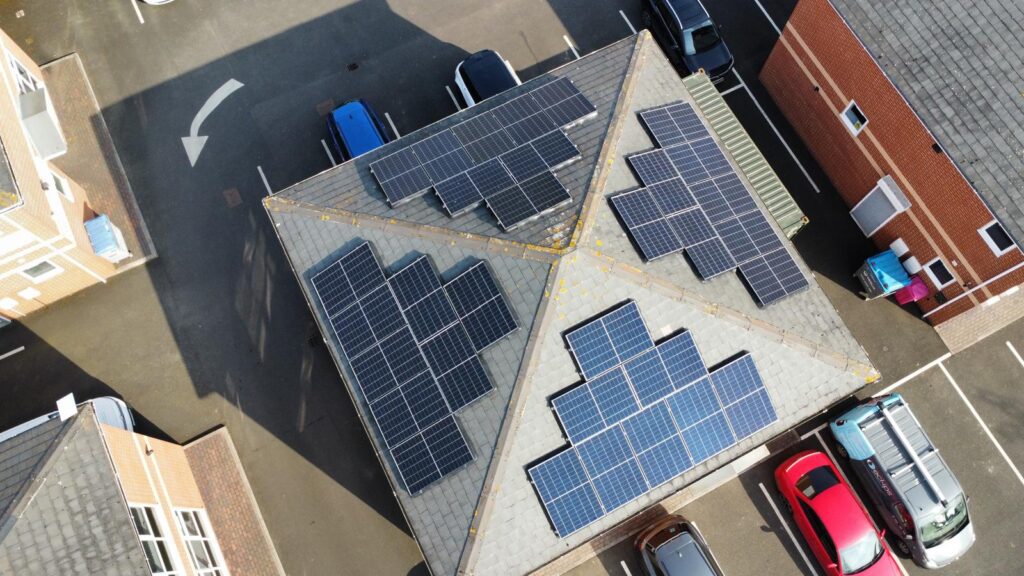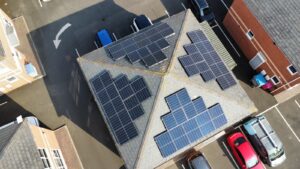Ecl-ips has taken a big step in reducing its carbon emissions and being more energy efficient with the installation of solar panels. These are on all sections of the roof at its offices on Harris Business Park in Stoke Prior near Bromsgrove.
Developing a Net Zero Plan
Like many companies Ecl-ips wanted to make a commitment towards greater sustainability and supporting the UK’s net zero target. Reaching net zero for Ecl-ips means achieving a zero overall impact on global greenhouse gas (GHG) emissions from our business activities. By aiming to do this it is supporting the UK’s commitment to Net Zero Carbon by 2050 which requires every person, household and business to play their part and is enshrined in law.
There are various steps that Ecl-ips can take to achieve net zero as a company and the solar panel installation form part of a wider sustainability policy and net zero plan we are developing. The company has been supported in this thanks to UK government funding. The Business Energy Advice Service (BEAS), being offered across the West Midlands, provided a free energy assessment and a consultation with Simon Maycock of The Clean Tech Business Group who has produced drafts of the policy and plan for the company to consider.
Solar panel installation
The cost of the solar panel installation was then partly paid for through a Net Zero grant. The pots of money are administered locally via Worcestershire County Council. The amount given was based on the level of emissions that would be saved by the product which equated to 40% of the price, although the criteria for future grants is due to change. The solar panels were installed by Econergy Solutions, a Bromsgrove-based company and this project will reduce scope 1 and 2 carbon emissions. Scope 1 are direct GHG emissions produced by Ecl-ips when running heating boilers and its vehicles. Scope 2 are indirect emissions from the generation of purchased energy, e.g. electricity.
This is a 14.88kWp Photovoltaics (PV) system with 3.72kWp installed on each of the four roof aspects. As well as the solar panels themselves a hybrid inverter has been installed. This means that the energy generated by the solar panels can used by Ecl-ips directly and if the company decides to install full battery storage in the future it will be easy to connect the solar panels to the batteries via the inverter.
Benefits of the solar panels
Overall, the energy currently generated should mean half is available for consumption by Ecl-ips and half will be exported to the national electricity grid. Electricity bills will be reduced significantly over the lifetime of the solar panels. Ecl-ips has a handy dashboard that tracks the energy being generated and exported. Currently the actual amount exported is capped however, based on the capacity the grid can handle.
Meanwhile, Econergy forecasts that four tons of carbon emissions will be avoided annually thanks to the solar panels. Over the systems lifetime this equates to 105,729 car kilometres and 76 long haul aeroplane flights being avoided.
More steps to sustainability
Scope 3 emissions are indirect emissions that include those produced in manufacturing of products we install, employee commuting and waste disposal. Steps to improve these that have taken place include increasing recycling within work spaces and communicating this to staff as well as going digital for operations so that paper use is minimal cutting waste.
Our partners have also made sustainability commitments, including reducing packaging and improving the sustainability of their manufacturing and supply chains. Paxton Access, for example, has become carbon neutral, partly through making changes in areas such as transport and energy efficient manufacturing as well as offsetting.
Ecl-ips is on a journey to contribute to the net zero goals as well as gaining benefiting from cheaper electricity thanks to the solar panel installation. We will keep you informed as to the further steps we take.



